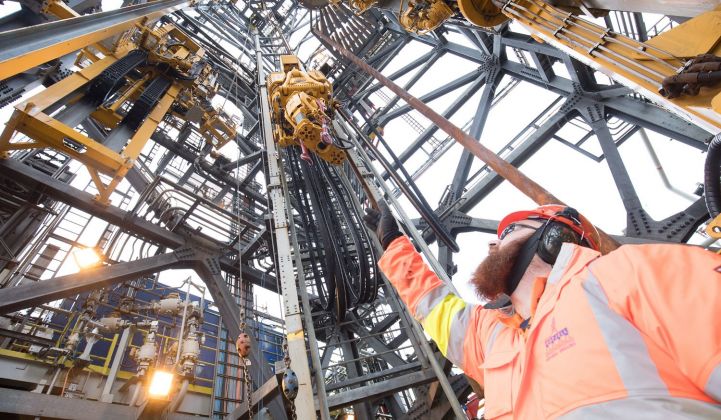Shell just did the thing CEO Ben van Beurden said no leader of the company would ever want on their record: cut its shareholder dividend for the first time since World War II.
In slashing Shell's dividend on Thursday from 47 to 16 cents per share, van Beurden made a dramatic statement on the global oil industry's current predicament. But what the supermajor and its peer BP are not cutting is also very telling.
Both BP and Shell released their earnings results this week, their first since the oil price crash and the emergence of the coronavirus pandemic — and since declaring their own net-zero ambitions. Despite the chaos in global oil markets, the pair of supermajors have committed to maintaining their low-carbon investment plans and spoken of an accelerating energy transition.
Oil companies around the globe are slashing their capital expenditures in response to the oil price collapse. The largest share of Shell's cuts — 45 percent — are coming from its upstream exploration business.
A quarter of Shell's planned $5 billion of capex savings will come from its integrated gas and new energies business unit, which is home to its renewable energy ventures. But van Beurden said Thursday that the new energies businesses would be mostly untouched.
“I wouldn’t say we have ring-fenced them; that would be too much,” he told reporters. “[But] there is an energy transition underway that may even pick up speed in the recovery phase of the crisis, and we want to be well-positioned for it."
Although it still accounts for a small part of its overall business, Shell has been a leader among oil companies in investing aggressively in clean energy companies and projects — including German energy storage specialist sonnen, U.S. solar developer Silicon Ranch, and offshore wind projects in Europe and the U.S.
“If we find projects that make sense, but the affordability constraints mean we have to make choices, we will probably give preference to the projects that will serve us better in the long-term future rather than the projects that we believe are going to eventually be curtailed,” van Beurden said.
Luke Parker, vice president with Wood Mackenzie’s corporate analysis team, said Shell's decision to cut its dividend is a “sensible and prudent action to preserve cash in the face of huge macro-uncertainty.”
“A permanent dividend reset would also help fund an accelerated strategic pivot to 'Big Energy' through the reinvestment of maturing oil and gas cash flow into the youthful zero-carbon energy sector,” Parker said.
BP stands by its planned low-carbon investments
Meanwhile, BP’s new CEO Bernard Looney said his firm has not shrunk its pot of money for energy transition investments this year.
“We've left our $500 million of low-carbon investment unchanged [and] untouched this year," Looney told investors on a Tuesday call. "Where we cut elsewhere, we did not cut that back. So we will, over time, be working hard to do more in that space.”
BP stuck to its own dividend when it published its own results earlier this week, but said its next dividend would be up for discussion. Last week Norwegian firm Equinor cut its dividend by the same proportion as Shell did.
Looney said BP's resolve to execute on the net-zero strategy it announced in February has only become “stronger” in the face of the multiple crises facing the sector.
“We talked a lot about the negative prices for WTI [West Texas Intermediate, a light sweet crude oil blend] just a few weeks ago. At the same time as that was happening, Lightsource BP was doing 400 megawatts of solar contracts in the U.S.," Looney said. "That sector continues to attract investment. It attracts investments because of its risk profile and its resilience."
Has coronavirus brought about peak oil?
Shell's van Beurden said the coronavirus crisis may have brought the date for peak oil demand a bit closer. Global demand for oil and gas plummeted 30 percent in the first quarter of 2020, he said.
“Will demand ever go back to where it was? That's hard to say. I think the key point to take away from this call is that we live a crisis of uncertainty at the moment. We have always said we expect oil and then later on gas demand to peak. We said [peak] oil demand could be as early as this decade. I think the likelihood of that happening has indeed gone up."
Looney went even further, suggesting that demand may never recover to pre-coronavirus levels. Most travel within BP has been temporarily scrapped and the majority of workers are at home. Some of these changes in society could be here to stay, he said.
“Not all of it, but I think there is a real possibility that some will stick and therefore the question has to be, will consumers consume less? And I think there is a real possibility that that may happen,” Looney said.




